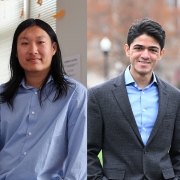Cancer Cells Send Out ‘Drones’ to Battle the Immune System From Afar

Cancerous tumors are more than a lump of cells growing out of control; they participate in active combat with the immune system for their own survival. Being able to evade the immune system is indeed a hallmark of cancer. Now, researchers show that, to assist in the fight, cancer cells release biological “drones,” small vesicles called exosomes circulating in the blood and armed with the protein PD-L1, which causes T cells to tire before they have a chance to reach the tumor and do battle.
The work, published in the journal Nature, is a collaboration between Wei Guo, a professor of biology, and Xiaowei Xu of the Perelman School of Medicine. While primarily focused on metastatic melanoma, the team found that breast and lung cancer also release the PD-L1-carrying exosomes.
The research offers a paradigm-shifting picture of how cancers take a systemic approach to suppressing the immune system. In addition, it also points to a new way to predict which cancer patients will respond to certain checkpoint inhibitor drugs, which disrupt immune suppression to fight tumors, and a means of tracking the effectiveness of such therapies.
“Immunotherapies are life-saving for many patients with metastatic melanoma, but about 70 percent of these patients don’t respond,” says Guo. “These treatments are costly and have toxic side effects, so it would be very helpful to know which patients are going to respond. Identifying a biomarker in the bloodstream could potentially help make early predictions about which patients will respond and, later on, could offer patients and their doctors a way to monitor how well their treatment is working.”
Click here to read the full story.





